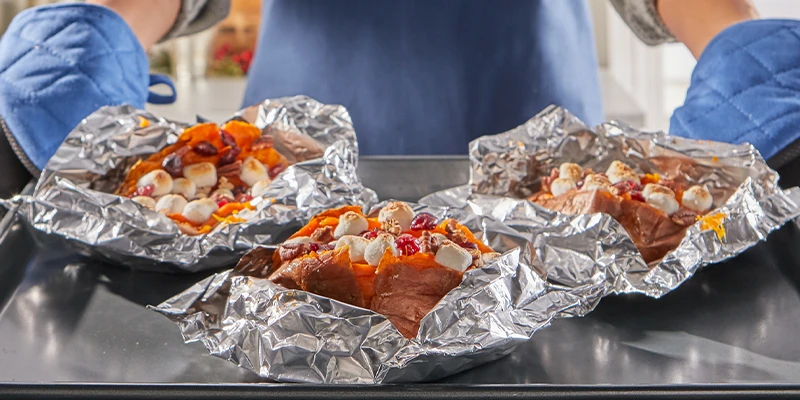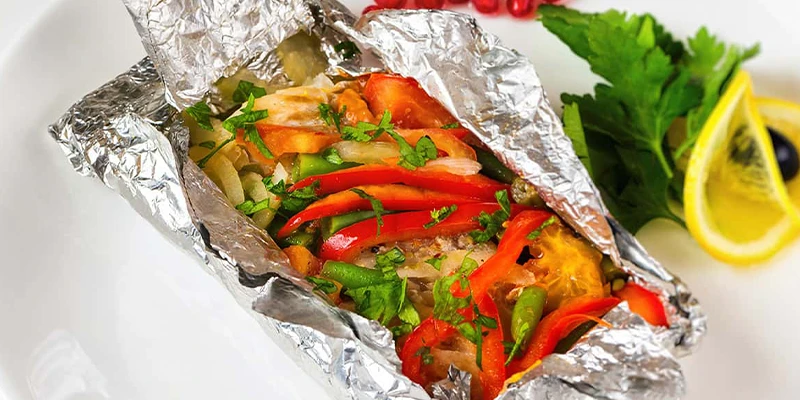When it comes to grilling, aluminum foil is a staple in many households. Whether you’re cooking burgers, vegetables, or seafood. But questions like “Is aluminum foil safe for grilling?” or “What’s the best aluminum foil for grilling?” often arise. In this guide, we’ll explore grilling foil.

Why Use Aluminum Foil For Grilling
Aluminum foil is a nice helper in the grilling process. Its ability to withstand high heat while maintaining its shape makes it a favorite among grill masters. One of the primary advantages of using aluminum foil for grilling is promoting even cooking. By placing a layer of foil on the grill, you can prevent small or delicate foods from falling through the grates or burning.
Another benefit is moisture retention. When you wrap food in aluminum foil before grilling, it traps the natural juices, resulting in tender and flavorful dishes. This method works particularly well for vegetables, fish, and lean cuts of meat that tend to dry out quickly.
Aluminum foil also simplifies cleanup. Grilling can be messy, with sauces and drippings sticking to the grates. By lining parts of the grill with foil, you can catch grease and prevent stubborn residues from building up.
For those who dislike scrubbing grill grates, non stick aluminum foil for grilling offers an excellent solution. Its coated surface reduces sticking, making it easier to flip burgers, fish fillets, and other delicate foods without leaving half of them behind on the grill.
Is Aluminum Foil Safe For Grilling
A common concern is whether grilling with aluminum foil poses health risks. The short answer is that aluminum foil is generally safe when used properly. The U.S. Food and Drug Administration (FDA) has approved aluminum foil for food contact, meaning it does not release harmful chemicals under normal cooking conditions.
However, some studies suggest that using aluminum foil with acidic foods—such as tomatoes, citrus, or vinegar-based marinades—may cause a minimal transfer of aluminum into the food. While the amounts are typically very small and not considered harmful by health authorities, those who want to minimize exposure can take precautions.
One way to reduce any potential risk is to avoid prolonged exposure of acidic foods to aluminum foil. Another option is to use heavy duty aluminum foil for grilling, as its thicker construction reduces the likelihood of breaking and leaching. Additionally, cooking at moderate temperatures rather than extreme heat helps maintain the foil’s integrity.
If safety concerns persist, alternatives to aluminum foil for grilling include stainless steel grill baskets, cedar planks, and parchment paper designed for high heat.
Best Aluminum Foil For Grilling
Choosing the right type of aluminum foil can enhance your grilling experience. Standard household foil is sufficient for basic tasks like wrapping corn on the cob or creating a makeshift drip pan, but when it comes to intense grilling sessions, heavy duty versions perform better.
Heavy duty aluminum foil for grilling is thicker and more resistant to tearing, making it ideal for covering large cuts of meat or constructing durable grilling packets. For those who frequently grill fish or sticky foods, non stick aluminum foil can prevent delicate items from breaking apart when flipped.
Another useful variation is aluminum foil with holes for grilling. These small perforations allow smoke and heat to penetrate while still protecting food from direct flames. This type of foil is excellent for achieving a smoky flavor without charring.
For convenience, pre-made aluminum foil bags for grilling are available, designed to hold vegetables, shrimp, or other ingredients while steaming them to perfection. They are particularly handy for campfire cooking and outdoor barbecues.

How To Use Aluminum Foil On The Grill
Using aluminum foil for grilling effectively requires some know-how. Here are some key techniques to ensure the best results.
Creating a foil packet is one of the most popular methods, especially for cooking vegetables and fish. To do this, place the food in the center of a foil sheet, fold the edges together, and seal tightly to prevent steam from escaping. The trapped heat gently cooks the ingredients, keeping them moist and flavorful.
For foods that benefit from direct heat, such as burgers and steaks, a useful trick is placing a sheet of aluminum foil on grill for burgers to prevent sticking. This is particularly helpful when dealing with lean meats that have little fat to lubricate the grates.
Another is using foil as a drip pan. By folding the edges upward to form a tray, you can catch excess grease and prevent flare-ups. This method works well when grilling fatty cuts like ribs or sausages.
Those wondering how to fold aluminum foil for grilling can experiment with different shapes to suit their needs. For example, a boat shape works well for holding liquids and marinades, while a flat sheet with small slits can allow smoke to reach the food while still protecting it from flames.
Common Grilling Questions About Aluminum Foil
Many grillers have specific questions about using aluminum foil for their barbecues.
One frequent query is whether aluminum foil affects the taste of food. While uncoated aluminum foil has no flavor of its own, it can sometimes react with high-acid dishes, imparting a slight metallic taste. Coated non stick varieties avoid this issue.
Another common question is whether aluminum foil can be reused. While it can technically be cleaned and reused for cooking, most experts recommend using fresh foil for food safety, especially after it has held raw meats. However, lightly used foil can be repurposed for non-food tasks like covering dishes or cleaning grill grates.
A practical use of foil is creating an aluminum foil alternative for grilling when other tools are unavailable. For example, if a grill basket is missing, shaping heavy-duty foil into a makeshift tray can work in a pinch.
Alternatives to Aluminum Foil for Grilling
While aluminum foil is highly effective, some grillers prefer other materials. Stainless steel grill baskets offer a reusable and sturdy option, ideal for vegetables, seafood, and smaller cuts of meat. Cedar planks, often used for salmon, infuse food with a rich, smoky flavor. Parchment paper designed for grilling is also a good choice for delicate items, though it lacks the heat resistance of foil.
For those seeking an alternative to aluminum foil for grilling entirely, cast iron skillets are a durable option. They retain heat well and provide excellent searing, though they require more maintenance than foil.
Preguntas frecuentes
- Is grilling with aluminum foil bad for you?
No—when used correctly. Avoid prolonged high-heat exposure with acidic foods. - What’s the best aluminum foil for grilling burgers?
Heavy-duty or non-stick foil prevents sticking and supports juicy patties. - Can I grill without foil?
Absolutely! Use grill mats, baskets, or cook directly on grates. - Are aluminum foil bags safe for grilling?
Yes, as long as they’re labeled for high-heat use.


